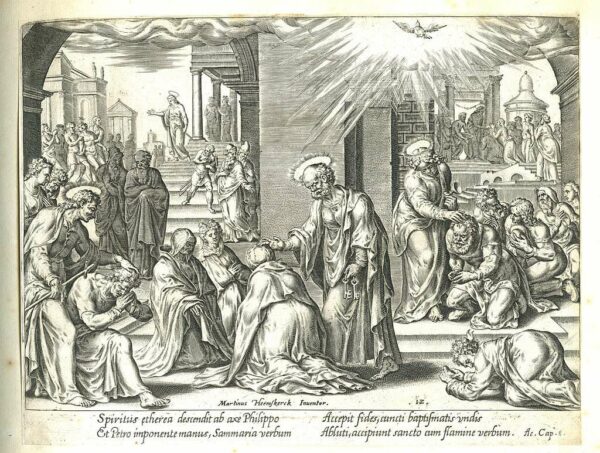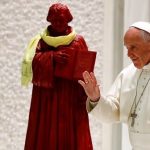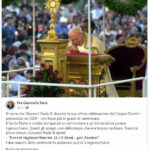Sixth Sunday of Easter (Year A)
I was a bit undecided about how to comment on this Sunday’s readings, because at first they seemed to lack a common theme, pointing to different directions. Is this Sunday just about tying up a few loose ends? Actually, the main point is brought forth, as usual, by the Gospel: Jesus announces his forthcoming Ascension, but promises to give his followers another Paraclete, the Holy Spirit. But still: how does this story connect with the other two readings?
Well, after a brief reflection I believe I got it; today’s theme is: examples of catholicity in action. The common thread, in other words, is: if you make the effort to look with an attentive eye, you will discover how Catholic the mythical primitive Christian community was.
Indeed in the First Reading we find Philip preaching in Samaria, that is, a region outside the respectable and properly recognized Israel. One could also focus on miracles, which may be of interest to us, but that’s not the subject of the passage. The meat of the story is represented by the concern of the Apostles, to maintain a cohesive and united community, confirming the brothers in faith. Even though it was already an apostle who converted these Samaritans, their next step is to send two more apostles, including Peter himself, to consolidate the result and visibly show the need to be together, part of a universal church. See how this is far removed from modern concepts like the independence of local churches, designed to cover all sorts of tastes!
To think of it, since Samaria was at risk of heterodoxy, the concern was even more justified (today’s German bishops come to mind, imagine that…).
Furthermore, here we find an insistence on a detail that is difficult for a classic Protestant to digest: not only is receiving the Holy Spirit of paramount importance… This Spirit isn’t received through naked faith, intensity of prayer, Christian songs or emphatic Hallelujah chants. It happens when the Apostles lay hands on people!
And to make matters worse, Acts specifies that these Samaritans had been baptized, but had not received the Holy Spirit yet. Here we aren’t about interpretations, feelings, special formulas to be recited once and for all, to recognize Jesus as one’s personal Savior. No, there are very precise and distinct events, Baptism (where the Holy Spirit is at work anyway!) and receiving the Holy Spirit from the Apostles (which today, can I say it?… Which today we call Confirmation).
See how the Holy Book is plainly stating the obvious, that there are these two distinct and complementary ways to be brought to Christ.
Two – sorry for rubbing it in – sacraments, already prominent, front and center, for the early community.
Here we can find one of the copious, crucial details scattered throughout the NT that tell us, indeed wake us up: this scarified, cerebral, dull Christianity, which was invented out of thin air after 1500+ years, by rebels that possessed little science and even less conscience… This dull Christian faith, I was saying, is NOT worthy of these pages, of this community, of this story. Those who deny the sacraments are just unable to come back to the Church of Christ: ecumenism, as it’s understood nowadays, doesn’t make any sense!
It makes no sense to try to water down our message by putting aside, as if unimportant, so many treasures of the Church, in the hope of creating a chimera of a unitary assembly with those who, faced with trivially clear passages like this, have to come up with sophistries to deny a living, concrete presence of the Holy Spirit in our lives. Not a vague idea; a Presence that flows through people designated to administer it!
For the writer, and for the Apostles, all these things were taken for granted, right from the beginning.
Once again, let me restate the obvious: we cannot afford to be ignorant, if we are believers. When some lowly know-it-all triumphantly proclaims that this or that sacrament are arbitrary, abusive inventions of later centuries, we can’t just shrug and move on…

In the Second Reading it is Peter who speaks. He invites us to be ready to give an explanation to anyone who asks for a reason for the hope that is in us: he does not preach an irrational faith, a foolish, arbitrary choice, as if there were more merit in believing without relying on one’s intellectual abilities. No, Martin Luther is indirectly condemned here, in his stupid hostility to reason. And here we can appreciate the Catholic tradition of apologetics, of openly preaching, making the best possible use of one’s faculties and knowledge, already in full display.
St. Peter himself tells us today that preaching earnestly entails not only showing gentleness and respect, but also a clear conscience; not earth-shattering, granted; but I’m thinking of some people that should take some time to reflect on this… The defense of the Church, when it overlooked inconvenient truths and tried to maintain an acquired position at all costs, silencing scandals while focused only on maintaining a good reputation, has caused major disasters (as we saw), not only by destroying the credibility of those shepherds covering up stories; not only confusing souls, but facilitating real sins and crimes, even heinous ones, and also destroying the good name of the Church that they wanted to protect to begin with.
Here’s a behavior that isn’t Catholic by all means, even if outside our Church everyone seems to consider it so, out of malice or ignorance: in order to return to Christ, here we just need to go back to St. Peter, to a spotless shepherd who’s not afraid of the truth, which is about the opposite of what happent to institutions that are only human.
Finally, the Gospel: here’s the “Paràclete”.
A big, hard word, as is naturally the case for words that have to render something new and specific, dare I say “technical”, for this new . Usually it’s translated as “advocate”, or “comforter”, but I like more a version whose source, unfortunately, I don’t remember: “the one who puts his arm around your shoulder”. The strong friend who accompanies you and supports you.
This is about the Holy Spirit, and please let’s not waste our time with alternative nonsense: it is an indisputable fact, even if a different term is used here.
Interesting: Jesus speaks about “another paraclete”: that is, someone like him, in his same role as our protector, help, support, guide, coach.
To increase the confusion, Jesus goes away and sends this Spirit; however, invisibly, for those who know how to see him, he too remains with us… Seems quite hard to make sense of all those oddities and of this “compresence”, if not with the traditional acceptance of concepts such as the Trinity, the invisible presence and omnipotence of God, combined with a plan that is based on a supernatural kind of love. A love for us, so strong that we’d have to miss a heartbeat every time we manage to think about it: he really cares about us, like, a lot!
Anyway, here one could say: but where is catholicity? After all, every word of this passage lends itself to multiple interpretations. Jesus clearly says that there are those that belong to him, who will continue to “see” him and be with him, even if not visibly, in concrete terms, and who will get help from the Spirit. And then there’s the world, the others, those who can’t see.
His people are his community, the ekklesia: the Church, which continues existing through time and expands in space, without interruption. This is how it goes: the message has a natural development, while any alternative interpretation is a stretch. A church without apostolic continuity, without a long line of bishops ordained one after the other starting from the apostles, is not the Church, period. It can’t even be part of it.
And yet a creative reader, as you may find since they’re everywhere nowadays, could interpret the words of this Gospel passage to say: but here we’re not necessarily talking about the Church. Who are those who belong to Jesus, to whom he speaks, since the message is projected into the future? Maybe they’re anonymous Christians, people who relive this promise in an intimate, personal sense: they see Jesus with the eyes of the heart, they feel the Holy Spirit within them! The people of God aren’t members of a group or an institution, some dare say. They are the people who love him! Through a deep, sincere feeling, not by following dogmas.
I think I can almost hear those words, don’t your ears ring?
Wait, wait, wait! Jesus here says:
Whoever has my commandments and observes them
is the one who loves me.
These are not fortune cookie platitudes. On the contrary, there’s an actionable call: to follow Jesus in what you do, in order to demonstrate that you love him. Here is the Catholic reality: good works are also needed. This can’t be about just accepting a generic faith without works! And so the heretics who arbitrarily mutilate the content are put again in their place… pardon, I mean the separated brothers, who insist on sola fide.
After all, if you follow Jesus, how could you not want to join his visible Church? Christianity without the Church is only an illogical extravagance that came into existence out of a bad conscience; sometimes, by now, it’s taken for granted and spread also out of habit, through hearsay…
In any case, back to the point: to escape the temptation to confine the whole discourse to a whimsical, self-referential bubble, containing capriciously intense feelings, Pentecostal sect style, just remember how indefensible it is to stop at the letter of a single passage, interpreted according to one’s wishes. The other passages that are read today have been put there on purpose, to remind us that there’s a concrete reality: special people given a very specific mission, to help others by preaching and bringing them the Spirit through visible acts, the Sacraments.
Did you perchance feel some discomfort deep inside, faced with the presumed audacity of this last statement of mine, which seems too bluntly pro domo mea, too simplistic, too old-fashioned?
I must confess I was indeed a little uncomfortable writing it. Look at how deep the conditioning we have received from modernity is, to the point of feeling ashamed for our reasonable doctrine.










































